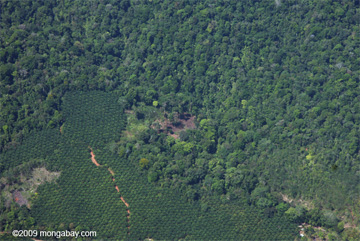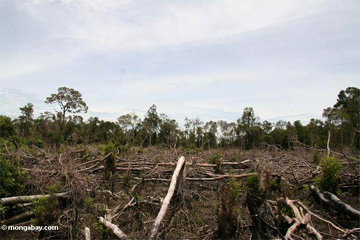Cadbury New Zealand, responding to widespread consumer protests, will stop adding palm oil to its milk chocolate products, reports the New Zealand Herald.
The candy-maker substituted palm oil and other vegetable fat for cocoa butter earlier this year. The company cited cost savings for the decision, but the move triggered outcry from environmental groups who blame palm oil production for destruction of rainforests across Indonesia and Malaysia, key habitat for orangutans and other endangered species. Concerns that Cadbury chocolate could be imperiling orangutans led the Auckland Zoo and others to ban Cadbury products. Meanwhile consumers swamped the company with letters and petitions protesting its use of palm oil.
 Oil palm plantation and rainforest in Costa Rica. |
Cadbury New Zealand managing director Matthew Oldham told the New Zealand Herald that consumer complaints led the company to change course.
“At the time, we genuinely believed we were making the right decision, for the right reasons,” said Oldham, noting that Cadbury was using only palm oil certified as sustainable. “But we got it wrong. Now we’re putting things right as soon as we possibly can and hope Kiwis will forgive us.”
Oldham said palm oil will be phased out of Cadbury milk chocolate products in “a few weeks.”
Certified palm oil
 Deforestation for a new oil palm plantation in Kalimantan (Indonesian Borneo). Lush aims to use anti-palm oil sentiments as a marketing strategy for increasing sales of its own products and extending its brand. Instead of palm oil, the company is using oils from sunflower, rapeseed, and coconut — crops with substantially lower oil yields than palm, and in the case of rapeseed, a similarly questionable environmental performance. |
The uproar over Cadbury’s use of “certified” palm oil raises questions for the palm oil industry, which has been working with green groups to establish environmental standards for palm oil production. Consumers in New Zealand either weren’t aware that Cadburys palm oil was certified or didn’t distinguish between certified and non-certified palm oil, suggesting that the industry is failing to effectively communicate with the public. For example Lush, a leading cosmetics-maker, said last week it would not only ban palm oil from its products, but launch a campaign to get other companies to follow suit.
Companies that have pledged to use only sources of palm oil that have been independently verified and certified to meet environmental and social sustainability criteria now are left to question whether these efforts will be enough to win over consumers in markets where such concerns factor into buying decisions.
Related articles
LUSH cosmetics launches campaign against palm oil
(08/10/2009) LUSH Cosmetics, a leading cosmetics-maker, will no longer use palm oil due to environmental concerns over its production. LUSH, which is now selling a palm oil-free soap, has launched a two-pronged campaign to make consumers aware of the impacts of palm cultivation on tropical forests and encourage other consumer-products companies, including Procter & Gamble, Unilever and Nestle, to reformulate their products using alternatives to palm oil.
Palm oil companies trade plantation concessions for carbon credits from forest conservation
(07/22/2009) Indonesian palm oil producers are eying forest conservation projects as a way to supplement earnings via the nascent carbon market, reports Reuters.
China to support greener palm oil
(07/15/2009) China-based producers and users of palm oil said they will provide more support for sustainable palm oil, reports WWF. The move could boost efforts to reduce the environmental impacts of the world’s most productive oilseed.
Failure to support greener palm oil may lead industry to abandon environmental measures
(07/08/2009) Consumer apathy towards eco-certified palm oil have undermined efforts to improve the environmental performance of the industry, a top industry official told Reuters.














